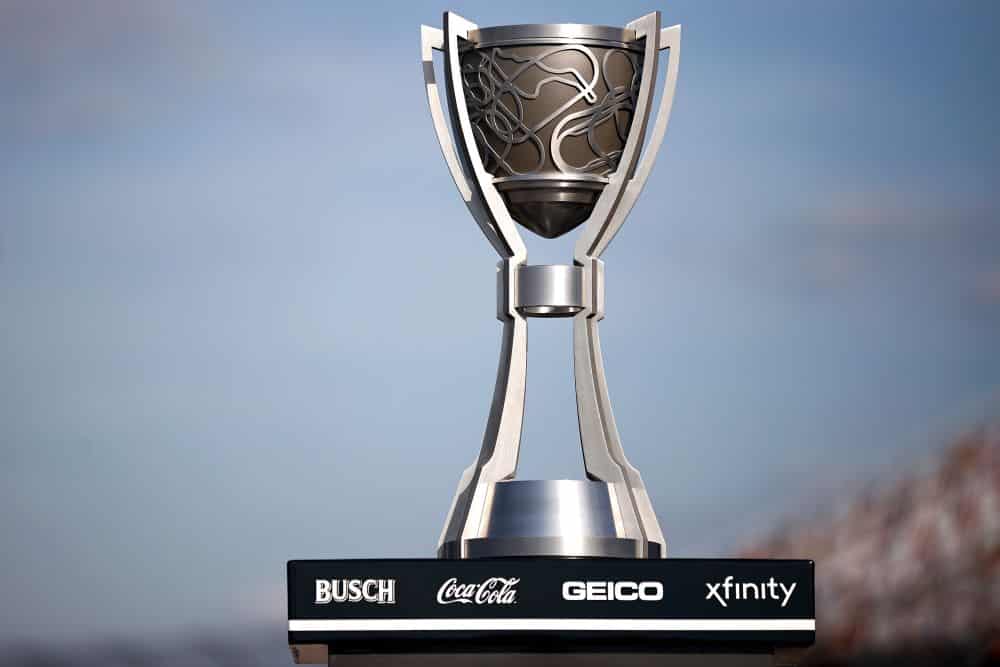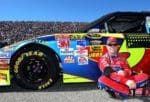You know how it goes.
If you like the NASCAR playoffs, you’re a stick-and-ball fan who doesn’t understand the history of the sport and doesn’t have the attention span to pay attention to the whole season.
But if you’re not a fan of a regular season/playoff format, you’re stuck in the past, putting nostalgia ahead of keeping up with the times.
There’s not always a lot of reasoning behind either argument. So here’s some: the playoffs (and the Chase before them) are detrimental to the sport and to its fans. Here are four reasons why:
It cheapens the title.
There, I said it. Fans should not have to look at a champion and question his worthiness. Yes, that happened under the Latford system as well (and even before the modern era), but the current system seems to encourage it. Under the full-season systems, if somebody won a title fans thought wasn’t quite earned, it was because of something the team did, like a penalty, or something that played out on track, like an untimely crash in the final race. We saw those things happen.
Under the current system, it’s as much on NASCAR as the teams. Constant points resets, stage points meant to encourage actual racing during the regular season that carry into the playoffs and a final cutoff race where multi-car crashes are all but guaranteed. It has become more about making sure there’s a good highlight reel than about letting the races — and the season — play out organically.
No, it isn’t sour grapes when someone’s favorite driver doesn’t win. When the winningest driver in a given season is denied the chance of being the champion because of a three-race stretch of bad luck in 35 weeks, it makes the driver who does win look undeserving, because fans know how the season really played out and who the best driver was.
If a driver wins multiple races in a full season and doesn’t win a title because he also had multiple subpar finishes, he loses the title on his own. Most fans would look at it as a missed opportunity because the team couldn’t find consistent results and move on. But under the current system, a couple of mediocre finishes at the wrong time can derail an entire season of consistency and wins. Sure, they could have scored more playoff points by trying to win stages, but teams should not have to choose to sacrifice their best race strategy for the stages, which are only there because drivers were employing a strategy to win races, even if that meant laying back to avoid issues early.
It’s not fair to the champion or his fans if people look at his title as less than a full-season champion’s title. The drivers didn’t have that system to play by; they had to win under what they had. It’s not their fault, or their fans’ fault, that many people don’t take their titles seriously.
It changed the way the regular season plays out.
NASCAR added stage racing because the title contenders had the system figured out. Take a look at the two postseason-era drivers with the most titles: Jimmie Johnson and Joey Logano. Johnson and his team were formidable in the late 2000s and early 2010s and won plenty of races, but they always seemed to have a little summer slump before taking off during the Chase, which was in place for six of Johnson’s titles.
Except by definition, it was hardly a slump. Once the team was fairly certain they’d make the Chase, they used a lot of races as test sessions for either the same tracks or similar ones in the championship run.
Logano and his team have figured out the playoffs in the same way. Lock in, and the rest of the regular season can be one extended test, and then pick it up well enough to advance through the rounds in the playoffs, giving themselves weeks, if not months, to prepare for the finale.
While that made the title run a lot of fun for their fans, it harmed the regular season. Not all the title hopefuls use every race as a test, and the drivers not locked in can’t do it to the same extent. But teams can gain more by logging laps and trying things sometimes than they can by racing for a win. That philosophy isn’t going to make a lot of fans eager to flock to a midsummer race to watch their favorite driver content to run 10th or 15th.
It’s hurt the racing in the playoffs, too.
While the playoff drivers do have to step up their game to avoid elimination, the rest of the field — either by design from their manufacturers, car owners or fear of being “that guy” for a playoff driver — too often tiptoes around the title contenders.
Even worse, the playoff drivers expect and even demand it. Drivers not in title contention should not have to decide between taking it easy on another driver because he’s a contender and doing everything it takes to get a win for themselves.
And that stepping up the game for the contenders? In the early rounds, that still means playing it safe a lot of the time. Drivers who aren’t hovering around the cut line aren’t going to take chances mid-race, often not even for stage points. Sometimes you even see one settle for a good finish instead of taking a risk to win if the points payout is right and they’re not in real danger of elimination.
They’re not doing anything wrong, but again, it’s a reason for some fans not to tune in for most of the race and instead join the broadcast for the final laps and not feel like they missed much. Which means…
Less value for sponsors.
If fans don’t tune in, they aren’t seeing commercials. While that might seem like a great strategy for catching the finish, it makes the commercial slots less valuable, and the networks have to sell even more to break even.
As for the sponsors who drop hundreds of thousands, if not millions, of dollars to be featured on a race car? Once the playoffs start, the drivers not involved might as well be invisible most of the time. They’ll get airtime if they do something that’s either incredibly spectacular or incredibly stupid, but most of the time, they’re pretty much ignored by the TV cameras.
That leaves sponsors questioning their return on investment and sometimes their future involvement in the sport altogether.
The playoff invisibility of more than half the field is also detrimental to their fans. Simply put, if your driver isn’t in the playoffs, don’t expect to see much of him on TV unless he’s winning, angering a playoff driver, crashing (especially if he also takes out a playoff driver) or occasionally if he’s running in the top five.
At the end of the day? Sure, some playoff races have great finishes. There’s some drama around the eliminations. Some drivers are racing for their lives and it shows.
But that doesn’t always, or even often, outweigh how the Chase and playoffs have harmed the sport and the fan experience. What the postseason has failed to do is create consistent hard racing for wins, nor has it eliminated the possibility of a driver with few or no wins — or one with wins but an overall subpar season — winning the title. In some ways, it actively encourages that very thing.
The reason many fans, as well as drivers past and present, want to see the sport return to a full-season format isn’t just rose-colored nostalgia. It’s because the playoffs have hurt the sport on a weekly basis and made the title little more than a dime-store trophy in the minds of many.
Amy is an 20-year veteran NASCAR writer and a six-time National Motorsports Press Association (NMPA) writing award winner, including first place awards for both columns and race coverage. As well as serving as Photo Editor, Amy writes The Big 6 (Mondays) after every NASCAR Cup Series race. She can also be found working on her bi-weekly columns Holding A Pretty Wheel (Tuesdays) and Only Yesterday (Wednesdays). A New Hampshire native whose heart is in North Carolina, Amy’s work credits have extended everywhere from driver Kenny Wallace’s website to Athlon Sports. She can also be heard weekly as a panelist on the Hard Left Turn podcast that can be found on AccessWDUN.com's Around the Track page.





